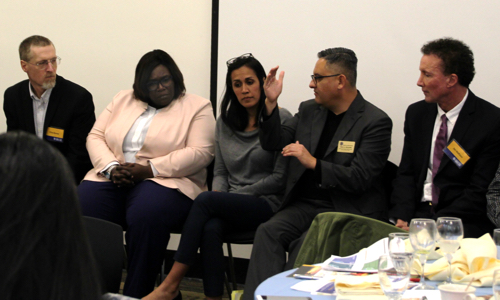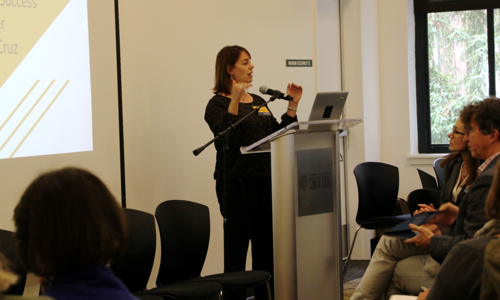In an effort to share the best means of supporting student success, UC Santa Cruz and CollegeNET last week held a symposium for educators across northern California.
The Feb. 26 symposium included keynotes from CollegeNET CEO Jim Wolfston, UC Santa Cruz Professor Chris Benner, and UC Davis Professor Marco Molinaro.
“Our goal for the symposium was to explore what we mean by ‘social mobility,’ why it is important, and how social mobility is connected to educational equity,” said Jaye Padgett, vice provost for the Division of Student Success. “We explored what the data tells us about potential and actual best practices in student success, and explored ways we could use data to identify and reduce barriers.”
UC Santa Cruz continues to attract a diverse student body and works hard to ensure a high-quality education is accessible for all Californians, regardless of family income. The symposium brought together higher education leaders to share and explore data-driven ways to ensure students are getting all the support they need as they pursue a degree and strive for social mobility.
Wolfston’s talk explored opportunities for reducing barriers to higher education and described CollegeNET’s Social Mobility Index, a data-driven analysis that ranks four-year colleges and universities according to how effective they are at enrolling students from low-income backgrounds and graduating them into good-paying jobs. UC Santa Cruz is among the top 25 universities on this index.
Benner presented an overview of the links between social equity and economic growth, and explored broad trends in higher education and the labor market. Molinaro shared his work understanding intersectionality and impacts on student success, and the ways UC Davis is engaging faculty in that process.
Seven-minute-long lightning talks featured:
- Debra Griffith, associate vice president for Transition and Retention Services, San Jose State
- Rebecca London, assistant professor, sociology, UC Santa Cruz
- Pablo Reguerín, associate vice chancellor for Student Achievement and Equity Innovation, UC Santa Cruz
- Rebecca Covarrubias, assistant professor, psychology, UC Santa Cruz
“College education is now the most important rung on the ladder of economic mobility,” Wolfston said. "But particularly when it offers a challenging environment populated with diverse ideas, personal backgrounds and viewpoints, a college does something even more important: it prepares students to encounter, navigate, and appreciate the unfamiliar.
“Given that innovation always depends upon a person’s ability to consider what could be different from their own assumptions and experiences, economic inclusion is thus not only a solution to a social justice issue, it is a key strategy for sparking innovative minds.”




